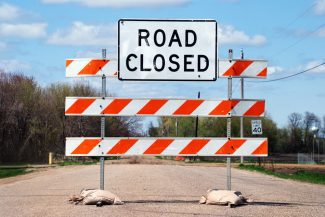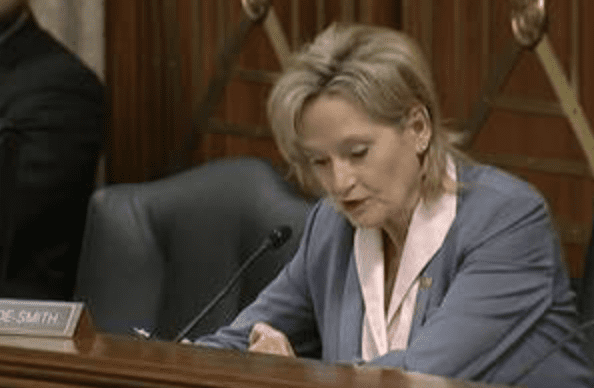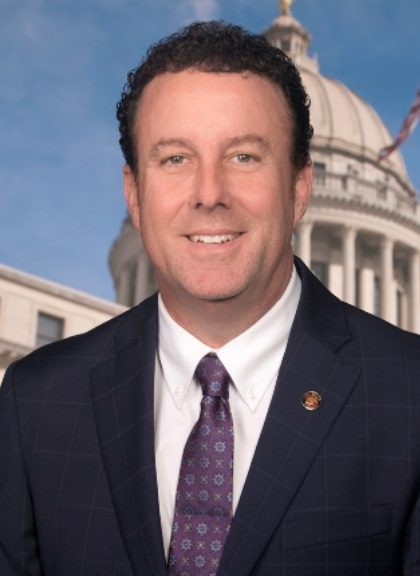
A bill in the Mississippi House of Representatives would provide for a statewide referendum to determine whether voters favor a temporary gas tax increase to fund specific road and bridge projects across the state. The author of the bill, House Ways and Means Chairman Trey Lamar (R), says once the specific projects are paid for, the new gas tax would roll off the books.
Though raising taxes or even creating a vehicle for voters to raise taxes is anathema to Republicans generally, rumors are circling around the Capitol that this effort may be connected as a revenue offset to a long rumored state income tax elimination program. More info is expected on that effort from Speaker Philip Gunn and the House next week.
#msleg House Ways and Means Chairman @tlamar44 hinted strongly on the Gallo show today that next week would essentially be the unveiling of the long awaited tax reform proposal.
Will Mississippi be able to eliminate the state income tax?
— Magnolia Tribune (@magnoliatribune) February 17, 2021
The structure of this referendum bill is akin to what Mississippi cities and towns have been asking for authority from the Legislature to do for decades through a municipal or local option sales tax but has thus far been squashed year after year, leaving local communities continuing to struggle. The majority of the revenue for cities and towns come from two sources – property and sales taxes.
“There isn’t a whole lot of difference,” State Rep. Charles Busby, chairman of the House Transportation Committee, told Y’all Politics on Wednesday when asked about how Lamar’s bill is structured as compared to the effort to allow the local option. Busby said he supported setting parameters to establish the municipal option, adding, “I agree that we sometimes appear to be hypocritical.”
“We want the feds to give power back to the states but we’re not really too keen on letting it pass back to the municipalities,” Busby said candidly.
Municipal or local option sales taxes are a means by which voters determine how their tax dollars should be used by their government, whether it be for infrastructure improvements like roads, water and sewer, or bridges, or for higher profile investments such as a new city hall or a sports complex.
The City of Tupelo is an example of how such local option taxes can be used successfully to provide improvements to a local community through voter supported, project specific temporary local tax increases.
Nearly 40 states allow for local governments to request approval from voters to fund capital improvement projects through a temporary sales tax increase following approval at the ballot box. The Mississippi Municipal League has advocated for these project specific sales tax increases that roll off the books once the work is completed for over 30 years and have not been able to get the Legislature to allow it uniformly in the Magnolia State.
MML released this video pushing for the passage of a local option in 2020’s prolonged session amid the pandemic:
Currently, if a city or town wants a local option for their voters to consider, that city or town has to first request an exception from the Legislature to allow that question to be placed before local voters and to what level, typically 1% to 3%. There has long been an unwritten rule among lawmakers that a municipality could have multiple local option increases considered but the combined amount should not exceed 5%.
Yet, using a similar mechanism to a far greater scale, Lamar’s bill seeks to raise revenue through sales tax on fuel for state capital improvements – new roads and bridges from Tennessee to the Coast, which would require ongoing maintenance and upkeep, along with repairs for others.

Further, an increase in the gas tax was once floated as a means by which the state income tax could be phased out, essentially shifting the tax from income to a user fee in the gas tax, along with other user generated revenue offsets, that would help mitigate the loss in state revenues in combination with budget cuts. Rep. Lamar’s measure would cut this option off at the knees.
There has not been a grand unveiling of an income tax phase out plan almost halfway through this legislative session, and this gas tax proposal on its own unlinked to that effort would be a tough vote for conservative members in either chamber. But both Rep. Lamar and Rep. Busby have indicated that a standalone measure for the income tax phase out is forthcoming.
Lamar hinted to SuperTalk‘s Paul Gallo on Wednesday that the income tax phase out bill is expected to be filed next week.
Busby told Y’all Politics that a bill to phase out the income tax is likely to come from Speaker Gunn who has been a strong proponent of the effort.
As for Lamar’s measure on the gas tax, the bill would ask voters to approve the following:
“PLEASE VOTE ‘YES’ OR ‘NO’
The following shall be implemented as provided by amendments to Sections 27-55-11, 27-55-519 and 27-55-521, Mississippi Code of 1972, as provided in House Bill No. , 2021 Regular Session:
Temporary increases to the rates of the gasoline and diesel fuel excise taxes provided in Sections 27-55-11, 27-55-519 and 27-55-521, Mississippi Code of 1972, for the purpose of providing funds for various road and bridge improvements projects throughout the State of Mississippi in order to enhance road and bridge safety and to provide for more efficient travel on and use of roads and bridges.
‘YES’: ________ ‘NO’: ________”
According to the usual referendum process in Mississippi, not only must an initiative receive a majority of the total votes cast for that particular initiative, it must also receive more than 40% of the total votes cast in that election. HB 1364 appears to follow that provision as it states that a majority of the qualified electors voting in the election would need to vote “Yes” on the question before being enacted.
Reading the proposed ballot language you would not know that, if voters approved, this would increase the gas tax 10 cents per gallon for a period of time whereas such bonds acquired by the state for these infrastructure projects would be paid in full, some 10-15 year period. The fund would be capped at $2.5 billion, with $2.3 million for the projects detailed in the bill, $100 million for a Municipalities Road and Bridge Fund, and $100 million for the Emergency Road and Bridge Repair Fund. Lamar told Gallo that those numbers are fluid and could be amended and changed on the floor by House members.
By comparison, most of the approved municipal or local option sales tax increase requests are for 1% to 3%, and would raise well below $1 million on average in Mississippi cities and towns through the 1-3 cents per dollar increase.
In addition, this bill states that beginning on July 1, 2031, and each succeeding July 1 thereafter, HB 1364 would allow for the rate of tax levied on gas to be indexed, meaning it would increase or decrease by a percentage amount equal to the lesser of 1% or the United States inflation rate for the previous calendar year and ending on December 31 as certified by the Commissioner of Revenue.
Municipalities do not have the luxury of tying their future revenues to an index, as Lamar’s bill proposes.
There are two bills filed this session that would allow for a municipal or local option sales tax – HB 303 and SB 2506. The two appear to be companion bills similar to what has been filed in past years. Both versions would allow municipalities to impose a 1% sales tax after 3/5 approval by voters. The allowable uses for the temporary tax would include recreational complexes, senior and community centers, auditoriums, libraries, major street projects, water and sewage systems, gas lines, and multipurpose buildings.
The Senate version was filed by Sen. Chad McMahan (R) and sits in the Senate Finance Committee. The House version was filed by Rep. Randy Rushing (R) and has been referred to the House Ways and Means Committee.
Rep. Lamar chairs the House Ways and Means Committee, the same committee the statewide gas tax referendum bill – HB 1364, or the “2021 Mississippi Road and Bridge Improvements Fund” – has been referred to this legislative session, meaning the gas tax bill has an increased chance of being passed out of committee for consideration on the House floor.
Politically, a vote for a tax hike or even a vote that makes way for a tax hike is a tough vote for rank and file Republicans. It can be the kind of vote that gets brought up at election time… in a primary. However, allowing the people to decide on whether they are willing to pay more for defined work or capital government improvements is a far easier way to defend a tax increase than merely calling a tax increase measure up and adopting it in the chamber.
If this is a mechanism to offset revenue lost from the elimination of a state income tax, which Republicans would enthusiastically support overall, it would certainly have easier sledding in the supermajority Republican Mississippi Legislature. But leaders and proponents are both going to have to do a pretty massive education and marketing effort to enlist voters to support that plan.
The question: Can legislators reconcile a gas tax referendum while continuing to oppose similar municipal or local options?
As House Transportation Chairman Busby said on Wednesday, “We want power at the lowest level of government unless it’s lower than us.”
###
Watch the full interview with House Transportation Committee Chairman Charles Busby where he spoke with Y’all Politics about Rep. Lamar’s proposal, among other things, on Wednesday.











